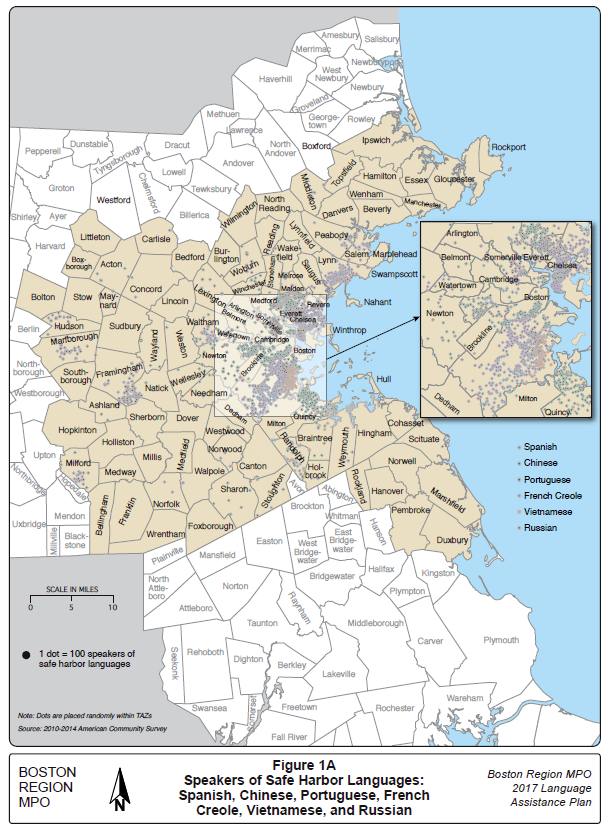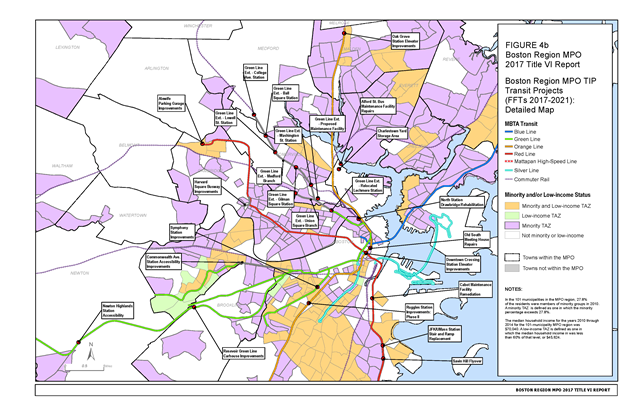The Boston Region Metropolitan Planning Organization (MPO) recently completed the Draft 2017 Triennial Title VI Report. This report presents the MPO’s efforts to ensure that federally protected populations are not discriminated against in the MPO’s various activities. This includes discrimination based on income, race, ethnicity, national origin, age, sex, and disability.
The Title VI report includes several analyses that examine the effects of the MPO’s three planning documents—the Long-Range Transportation Plan (LRTP), the Transportation Improvement Program (TIP), and the Unified Planning Work Program (UPWP)—on some of the protected populations.
UPWP
For the UPWP, the MPO looks at which municipalities in the region have been the subjects of MPO transportation studies or recipients of technical support. For each municipality, the assessment documents the population that is minority and low-income, the number of UPWP tasks that have occurred in each federal fiscal year (FFY) since 2010, and the municipality’s number of roadway miles.
TIP
The MPO completes three analyses for the TIP. These include:
- An analysis that determines whether the MPO is funding TIP projects that serve protected populations. This was done by comparing the percent of each protected population that is served by TIP projects with their total populations within the region. The results show that projects in the most recent TIP were distributed equitably to those populations.
- A map (below) showing the location of transit projects in the TIP, overlaid on communities that have high concentrations of low-income and minority populations.
- Finally, an analysis of the distribution of public transit funding to low-income and minority passengers for the current TIP (FFYs 2017–21). The results show that, overall, minority passengers receive less investment relative to their ridership (26.0% vs. 34.0%, respectively), as do low-income passengers (22.8% vs. 28.5%). As this is the first time that this analysis was completed, the MPO will continue to track the results of the analysis and plan to develop a policy that determines whether the results constitute disparate impacts for minority and low-income populations.
LRTP
An analysis of benefits and burdens compared the impacts of the LRTP on low-income and minority populations to non-low-income and nonminority populations. This included looking at the effects of the plan on residents’ travel time, congestion, accessibility to jobs, and carbon monoxide emissions. The analysis is conducted when the LRTP is developed, every five years. The last LRTP was completed in 2015; the analysis found that neither low-income nor minority would be significantly more negatively affected or receive significantly fewer benefits than non-low-income and nonminority populations.
Common Spoken Non-English Languages in the Boston Region

The MPO also looked at the number of people within the MPO region whose first language is not English and who have limited English proficiency (LEP). The analysis found that 311,134 (10.4% of the region-wide population) fall into this category. The most commonly spoken non-English languages are Spanish (3.5% of the region-wide population), Chinese (1.7%), and Portuguese (1.2%). The report includes the MPO’s strategies to ensure that LEP persons have access to the MPO services, including translations of materials on the MPO website and the provision of free language services at MPO meetings as requested.
Learn More
The report is now available for public comment through Tuesday, July 18. The draft is available here. You may email or use our online comment form to submit your feedback. MPO staff will hold office hours on July 6, 2017, from 1:30 PM to 3:00 PM and July 13, 2017, from 1:30 PM to 6:00 PM. Office Hours are opportunities for one-on-one conversations with MPO Staff. Members of the public are welcome to stop by our office to discuss any element of the Draft 2017 Triennial Title VI Report.

